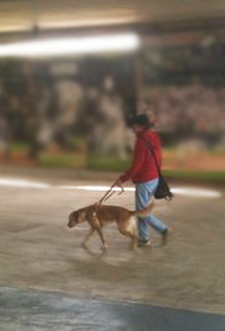The best supports I had after becoming disabled
by Beth
 DC Matthews @macdoodled left a comment on twitter about a post I wrote last week about visual art. In the post, I’d said “I lost my sight in my 20s, and one thing that helped me adjust was figuring out what I could still enjoy.” DC Matthews @macdoodled responded by asking:
DC Matthews @macdoodled left a comment on twitter about a post I wrote last week about visual art. In the post, I’d said “I lost my sight in my 20s, and one thing that helped me adjust was figuring out what I could still enjoy.” DC Matthews @macdoodled responded by asking:
Were you able to get slowly acclimated & not lose housing & safety net? Many injured/other disabled lose all and get less SSI /Medical. I think if we compare experiences we can see how better supports makes people more able and have far less losses.
My answer is yes. I was very fortunate — I acclimated slowly, and was able to do so without losing my housing or a safety net. I received so many services and so much emotional support from friends and family that I could write a book.
Wait a second. I did!
No one was more surprised than I was when my memoir, Long Time, No See got published. I lost my job when I lost my sight. I was depressed, but I couldn’t afford to see a counselor, and writing was therapeutic. So I wrote.
I’d kept journals while undergoing eye surgeries. When the surgeries failed, my husband got a no-interest loan from some of those supportive friends I mentioned above and bought me a talking computer. My husband has continued supporting me both emotionally and financially — we’ve been married 30 years now.
I used my new talking computer to continue journaling, but those journal pieces weren’t initially written with a book in mind. Writing was simply cheap therapy. When those supportive friends of mine suggested I write a book, though, I started checking out the competition.
My blog post last Friday described BARD, the free audio book program the Library of Congress provides for people who are blind or have physical disabilities that prevent them from reading print. I got signed up for BARD while I was still in the hospital recovering from eye surgeries, and once home I started listening to audio books written by authors who were blind.
Most had either found God or performed amazing feats, like sailing across the Atlantic alone. I’d done neither. Was there room for a book by an nonathletic pagan who’d lost her sight?
I decided to find out. A book project, I reasoned, would force me to finally gather my cassettes, floppy discs and other computer journal entries together in one place. And if I managed to get published, maybe I could parlay my literary success into a career of some sort.
I received Social Security while I worked on the book and went to a residential facility in Chicago for free rehabilitative services to learn Braille, daily living skills and orientation and mobility. A few years later I trained for four weeks with a guide dog at the Seeing Eye school in New Jersey for a month, all for the nominal fee of $100 (they let me pay in 20 five-dollar monthly installments). That Seeing Eye dog changed my life, and so did the other blind people I met during the training there. Nearly all of them were working –some of them were professors, attorneys, social workers –and they served as living examples of how life could still be meaningful and fulfilling without sight.
All to say that various supports can make all the difference with transitioning into this, well, this new way of life, and you really can come out okay on the other side. Whether it’s knowing where to learn about programs and resources, or accessing the family and friends who can help, the transition will undoubtedly be hard work. For me, at least, it was well worth the effort.
Related Resources:
If you’re a young women with a disability and looking for support, as Beth was, try logging on to Easter Seals Thrive, an online community for young women with physical and mental disabilities.






